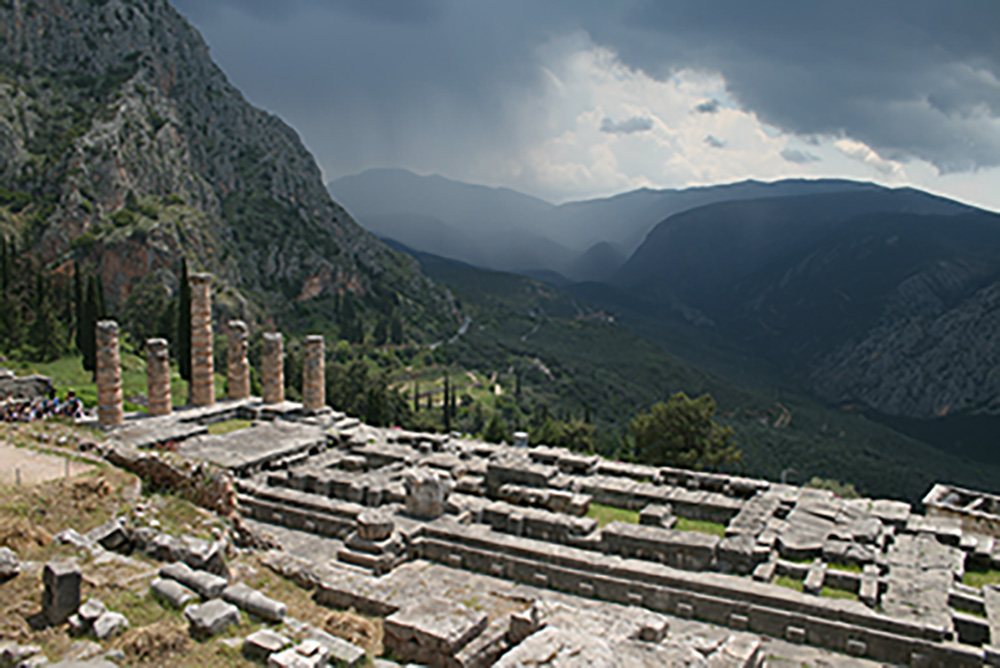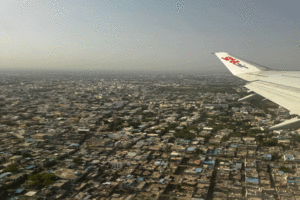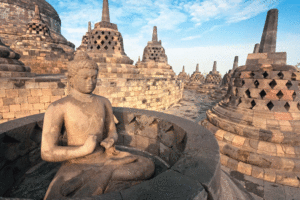The Delphi city today is a world heritage site in the region on the south-western slope of Mount Parnassus in Greece. It is now an extensive archaeological site, and since 1938 a part of Parnassos National Park. The precinct is recognized by UNESCO as a World Heritage Site in having had a great influence in the ancient world, as evidenced by the various monuments built there by most of the important ancient Greek city-states, demonstrating their fundamental Hellenic unity. It rose in importance because in Greek mythology Delphi city is the centre of the world. According to Greek mythology, Zeus left two eagles to fly, one to the East and one to the West, and they met in Delphi, making it the centre of the world. Its origins are believed to be older than that from the ancient Krisa, which once was the ruling power of the entire valley system. It was a Mycenaean stronghold. Archaeological dates of the valley go back to the Early Helladic. Krisa itself is Middle Helladic. These early dates are comparable to the earliest dates at Delphi, suggesting Delphi was appropriated and transformed by Phocians from ancient Krisa. In the year 390 Delphi was captured by the Romans and destroyed by the emperor Theodosius I. Falling into disuse for many centuries before being resettled, finally the site was occupied by the village of Kastri, with about 100 houses, 200 people. However, when its importance was realised once again a systematic excavation of the site could not be undertaken until the village had been relocated, but the residents resisted. The opportunity to relocate the village occurred when it was substantially damaged by an earthquake, the villagers were offered a completely new village in exchange for the old site. In 1893, the French Archaeological School removed vast quantities of soil from numerous landslides to reveal both the major buildings and structures of the sanctuary of Apollo and of the temple to Athena, the Athena Pronoia, a fifth-century Christian basilica, eastern Roman Baths, the large cistern along with thousands of objects, inscriptions, and sculptures. Over the decades its historical importance and value has increased and since 1987 a UNESCO World Heritage site. The name Delphi shares the same root with the Greek word for womb, and the city is seen as a central place to Greek mythology.
The nation of Israel was a feeble nation in Bible times, its very existence seemed to depend on the caprice of the protecting kings who had permitted its return. It had had bitter experience of the unreliableness of a monarch’s whim. The central verse in the whole Bible is Psalm 118 verse 8 says ‘It is better to trust in the LORD than to put confidence in man.’ And how true it is! The experience of the nation of Israel found it true and God reminds us in this song that it is not good to put confidence in man because that is like trusting in a broken staff. Man is only a mere shadow, which can yield no support or relief. Therefore, he exhorts us to trust in the Lord as he is able to help, and as well as willing to help he is faithful to his word in the Bible. He is unchangeable in his promises contained in the word. Whereas man, though he may have a will to help, oftentimes it is not in his power to help. When it is in his power, and he has promised to help, he disappoints, being changeable or unfaithful to his word. Wherefore trust not in man, but in the Lord. When we do that fear of and confidence in man are both removed by trusting in God. The Greeks trusted in their city and mythologies but today it lies in ruins at the whim on mere men. Broken and destroyed, abandoned and derelict, ruins for tourists to walk around and consider the former greatness and glory. This centre of the world for the Greeks is long faded in the past and forgotten but by a few. However, the Bible says when we trust in God he will never abandon nor destroy us.
P. Pilgrim pilgrimway101@yahoo.com




